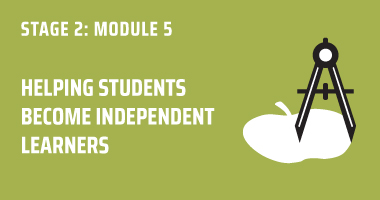Lesson 7 - Assessment FOR Learning with Wise Feedback
HELPING STUDENTS BECOME INDEPENDENT LEARNERS
TIMING/TASKS: Video Length 17 minutes. To complete this lesson: 1) Watch video to end; 2) Read additional text below; 3) Download & complete exercise(s) in right column
Assessment FOR Learning with Wise Feedback
OUTCOMES
LESSONS IN THIS MODULE
DOWNLOADS FOR THIS MODULE
RESOURCES
EXERCISES
No Exercise this Lesson
I know a variety of user-friendly formative assessment tools specifically for students to use.
I can coach a dependent learner in the use of one or more of these formative assessment tools so that the student sees ways to make small, positive improvements.
I can institute a culture of reflection that uses protocols and structures to teach the cognitive habit that helps my class become a true community of learners.
Throughout Module 5, we have focused on getting dependent and compliant learners to think, act, and engage differently when it comes to instruction. In the last lesson, we reviewed what it means to have deliberate “instructional conversations” with students during a long space of time.
I mentioned that a key part of what happens within an instructional conversation with students, whether it’s one-on-one conferencing or in-the-moment “micro-sized” coaching, is that we want to help students be metacognitive about their learning moves and tracking their progress.
The key to doing that means you are providing students with formative assessment tools. We typically talk about formative assessment as part of our own reteaching process. But within culturally responsive instructional practice, designed to interrupt inequity by design, (the under-development of student cognition that leads to dependent learning) we want to coach students to use formative assessment tools to check their own understanding and level-up their retention and internalization of the content.
With the foundation set with the reframing of errors as information (Lesson 2 in this module), you are positioned to coach students to shift their attention to the connection between improving, practicing, and deeper understanding, as a result of making small changes in their learning moves.
Formative assessment or assessment for learning is a critical bridge between teacher scaffolding and the gradual release of responsibility to the student, as he gets better at carrying more of the cognitive load. But students will not be able to carry more of the cognitive load if they are not conscious of their own learning process — and learn to manipulate it at will.
ACTION ITEMS
As part of your planning, identify a set of formative assessment tools.
Make time and space for students to talk about and explore these tools as an extension of the work you began with them around reframing errors as information.
Use stations or a world café protocol to help structure the conversations.
Save to My Content

